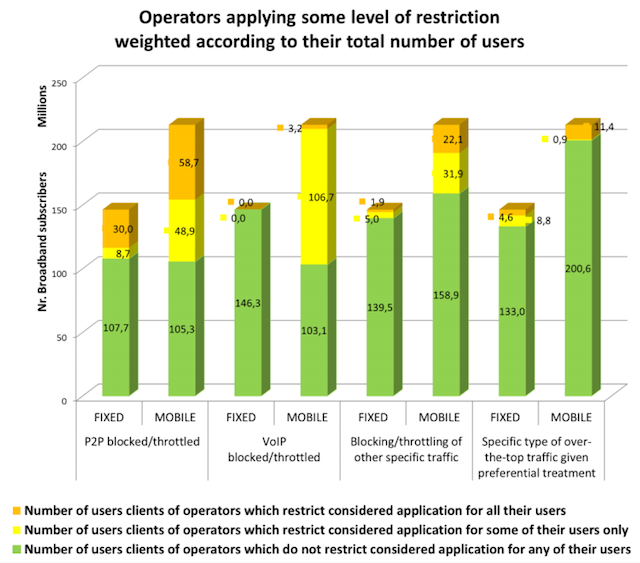
Want to make a Skype call through your smartphone in Europe? At least one-fifth of mobile broadband users on the continent face technical or contractual restrictions on their use of VoIP products, while more than a third of European mobile users also have restrictions on their P2P usage.
When it comes to the fixed-line Internet market, the situation with regard to blocking and throttling is better. VoIP is almost never limited, though P2P usage can be. But the real concern comes from wireline companies which manage their network to offer "specialized services"—think TV, like AT&T's U-verse in the US. Regulators note that 35 percent of wireline operators take various approaches to prioritizing these services in ways "which could potentially affect the (public and best efforts) Internet access service being delivered through the same access network."
The results come courtesy of a new Europe-wide survey on ISP practices (PDF), one performed by the meta-regulatory group Body of European Regulators for Electronic Communications (BEREC). BEREC's various national regulators wanted to know if more prescriptive network neutrality rules are needed to preserve the open Internet; to begin their consultation, they surveyed several hundred European mobile and fixed-line operators.
The results confirmed that, while the Internet is largely open, European mobile carriers in particular have fewer compunctions about imposing outright bans on competitive products like VoIP and instant messaging. When incumbent telco KPN tried exactly these two strategies in the Netherlands as a way of maintaining its historic average revenue per user (ARPU), the Dutch parliament responded by passing Europe's first network neutrality law forbidding the practice. KNP complied, but raised its rates.
BEREC's survey finds that these sorts of limitations merit monitoring, but the group is optimistic that "competition is expected to discipline operators." This fits with the European Union view; in 2010, EU Commissioner Neelie Kroes called on those cut off from Skype to "vote with your feet and leave your mobile provider." This may not always be possible; as Skype noted at the time, "You can’t vote with your feet in France, where ALL mobile operators have restrictions in place on using VoIP (or peer-to-peer or newsgroups)," and many Europeans live in an area "where just one network provider is available."
Where competition is lacking, BEREC's regulators "are ready to act without hesitation if necessary. BEREC is committed to the open Internet."
reader comments
23